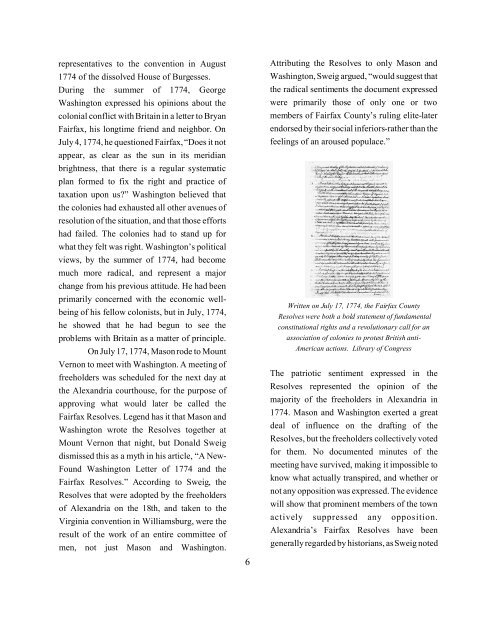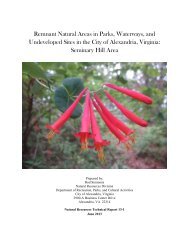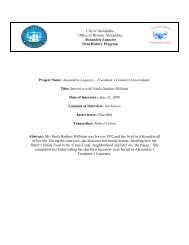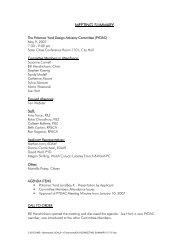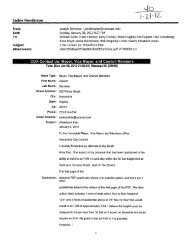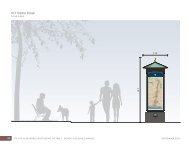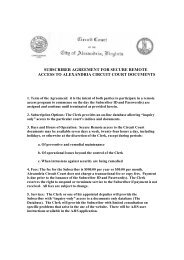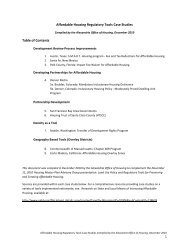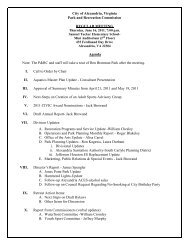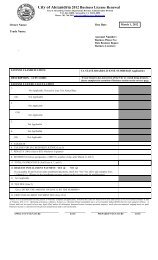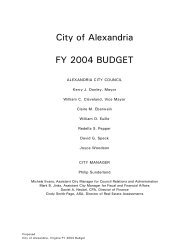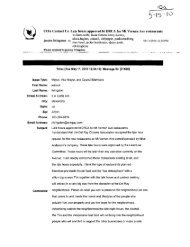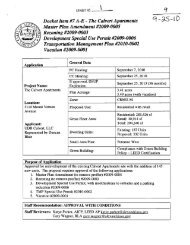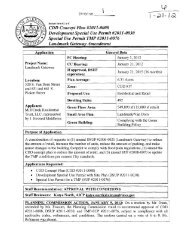LOYALISM IN EIGHTEENTH CENTURY ... - City of Alexandria
LOYALISM IN EIGHTEENTH CENTURY ... - City of Alexandria
LOYALISM IN EIGHTEENTH CENTURY ... - City of Alexandria
You also want an ePaper? Increase the reach of your titles
YUMPU automatically turns print PDFs into web optimized ePapers that Google loves.
epresentatives to the convention in August<br />
1774 <strong>of</strong> the dissolved House <strong>of</strong> Burgesses.<br />
During the summer <strong>of</strong> 1774, George<br />
Washington expressed his opinions about the<br />
colonial conflict with Britain in a letter to Bryan<br />
Fairfax, his longtime friend and neighbor. On<br />
July 4, 1774, he questioned Fairfax, “Does it not<br />
appear, as clear as the sun in its meridian<br />
brightness, that there is a regular systematic<br />
plan formed to fix the right and practice <strong>of</strong><br />
taxation upon us?” Washington believed that<br />
the colonies had exhausted all other avenues <strong>of</strong><br />
resolution <strong>of</strong> the situation, and that those efforts<br />
had failed. The colonies had to stand up for<br />
what they felt was right. Washington’s political<br />
views, by the summer <strong>of</strong> 1774, had become<br />
much more radical, and represent a major<br />
change from his previous attitude. He had been<br />
primarily concerned with the economic well-<br />
being <strong>of</strong> his fellow colonists, but in July, 1774,<br />
he showed that he had begun to see the<br />
problems with Britain as a matter <strong>of</strong> principle.<br />
On July 17, 1774, Mason rode to Mount<br />
Vernon to meet with Washington. A meeting <strong>of</strong><br />
freeholders was scheduled for the next day at<br />
the <strong>Alexandria</strong> courthouse, for the purpose <strong>of</strong><br />
approving what would later be called the<br />
Fairfax Resolves. Legend has it that Mason and<br />
Washington wrote the Resolves together at<br />
Mount Vernon that night, but Donald Sweig<br />
dismissed this as a myth in his article, “A New-<br />
Found Washington Letter <strong>of</strong> 1774 and the<br />
Fairfax Resolves.” According to Sweig, the<br />
Resolves that were adopted by the freeholders<br />
<strong>of</strong> <strong>Alexandria</strong> on the 18th, and taken to the<br />
Virginia convention in Williamsburg, were the<br />
result <strong>of</strong> the work <strong>of</strong> an entire committee <strong>of</strong><br />
men, not just Mason and Washington.<br />
6<br />
Attributing the Resolves to only Mason and<br />
Washington, Sweig argued, “would suggest that<br />
the radical sentiments the document expressed<br />
were primarily those <strong>of</strong> only one or two<br />
members <strong>of</strong> Fairfax County’s ruling elite-later<br />
endorsed by their social inferiors-rather than the<br />
feelings <strong>of</strong> an aroused populace.”<br />
Written on July 17, 1774, the Fairfax County<br />
Resolves were both a bold statement <strong>of</strong> fundamental<br />
constitutional rights and a revolutionary call for an<br />
association <strong>of</strong> colonies to protest British anti-<br />
American actions. Library <strong>of</strong> Congress<br />
The patriotic sentiment expressed in the<br />
Resolves represented the opinion <strong>of</strong> the<br />
majority <strong>of</strong> the freeholders in <strong>Alexandria</strong> in<br />
1774. Mason and Washington exerted a great<br />
deal <strong>of</strong> influence on the drafting <strong>of</strong> the<br />
Resolves, but the freeholders collectively voted<br />
for them. No documented minutes <strong>of</strong> the<br />
meeting have survived, making it impossible to<br />
know what actually transpired, and whether or<br />
not any opposition was expressed. The evidence<br />
will show that prominent members <strong>of</strong> the town<br />
actively suppressed any opposition.<br />
<strong>Alexandria</strong>’s Fairfax Resolves have been<br />
generally regarded by historians, as Sweig noted


